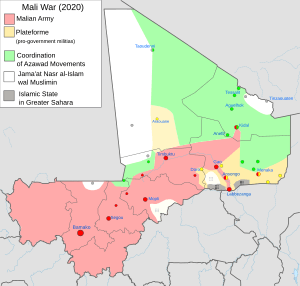Mali war facts for kids
The Mali War is a conflict that started in January 2012 in the country of Mali in Africa. It began when groups in northern Mali, especially the Tuareg people, started fighting the government. They wanted northern Mali, which they called Azawad, to be independent or to have more control over itself.
By April 2012, a group called the National Movement for the Liberation of Azawad (MNLA) had taken control of the northern region. Around the same time, on March 22, 2012, Mali's president, Amadou Toumani Touré, was removed from power by soldiers in a military takeover. This happened because the soldiers were unhappy with how the president was handling the crisis.
After the military takeover, Mali's three biggest northern cities—Kidal, Gao, and Timbuktu—were quickly taken over by the rebels. On April 6, 2012, the MNLA announced that northern Mali was now independent and called it Azawad.
At first, the MNLA had support from an Islamist group called Ansar Dine. But after the Malian army left the north, Ansar Dine and other Islamist groups started to enforce strict Islamic law, known as Sharia. The MNLA and the Islamist groups had different ideas for the new state, so they started fighting each other. By July 2012, the Islamists had taken control of most of northern Mali's cities from the MNLA.
The government of Mali asked for help from other countries to get the north back. On January 11, 2013, the French military began fighting the Islamists. Soon after, forces from other African countries also joined. By February 8, the Malian military, with international help, had taken back the areas controlled by the Islamists. Even though a peace deal was signed in 2013, and again in 2015, fighting continued.
How the Conflict Started
In the early 1990s, Tuareg and Arab people in northern Mali formed a group to fight for independence. Even though they signed peace agreements with the government in 1991 and 1995, many former Tuareg fighters were still unhappy. This led to new fighting in 2007.
The National Movement for the Liberation of Azawad (MNLA) was a new group that formed from an earlier political movement. After the 2011 Libyan Civil War, many weapons became available, which helped the Tuareg groups get armed. The strength of this new uprising, with its heavy weapons, surprised officials in Mali.
The MNLA was mostly made up of Tuaregs, but they said they also represented other groups. Their leader, Bilal Ag Acherif, stated that Mali should either allow the people of the Sahara region to decide their own future, or they would take it themselves.
Another group, the Islamist Ansar Dine, initially fought alongside the MNLA. However, Ansar Dine did not want independence for Azawad. Instead, they wanted to apply Islamic law (Sharia) across all of Mali. Their leader, Iyad Ag Ghaly, had been part of an earlier rebellion and was linked to another Islamist group.
Mali was facing several problems that made the conflict worse:
- State Crisis: The MNLA had wanted a Tuareg state since a rebellion in 1962. Mali has always struggled to keep control of its territory.
- Food Crisis: Mali's economy relies heavily on help from other countries. This led to blockades that made things harder for the military government.
- Political Crisis: The military takeover in 2012 caused the president to lose power, adding to the instability.
Peace Efforts and Changes
A peace agreement between the government and Tuareg rebels was signed on June 18, 2013. However, the rebels pulled out of the deal on September 26, 2013. They claimed the government had not kept its promises.
In mid-2014, the French military ended its first operation in Mali. They then started a larger regional effort called Operation Barkhane to fight terrorism. Despite another ceasefire in February 2015 and a peace agreement in April 2015, the fighting continued.
From 2018 onwards, there were more rebel attacks in the Sahel region. Mali also experienced two successful military takeovers in 2020 and 2021. After the 2021 takeover, the Malian government and French forces had disagreements. The Malian government asked the French to leave. Amid protests against France in Mali and more involvement from the Russian mercenary group Wagner Group, France completely pulled its forces out of the country by August 15, 2022.
Images for kids
-
French soldiers in Gao, in March or April 2013.
See also
 In Spanish: Guerra de Malí para niños
In Spanish: Guerra de Malí para niños
 | Chris Smalls |
 | Fred Hampton |
 | Ralph Abernathy |










